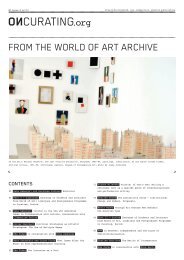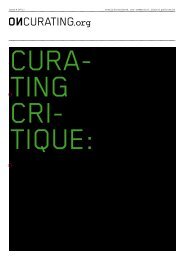You also want an ePaper? Increase the reach of your titles
YUMPU automatically turns print PDFs into web optimized ePapers that Google loves.
063 Issue # 11/11 : PublIc Issues<br />
production that is currently b<strong>as</strong>ed largely on misuses;<br />
and how is it going to alter it in the future?<br />
Seçil: The activation of the misuse value of space sounds<br />
quite appealing but it contains a paradox. Using the term<br />
misuse means presuming that a structure generating itself<br />
through conservative and functional uses actually exists.<br />
That would mean that we are inserting what we have been<br />
criticising so far into the definition of space. However,<br />
space already does have this quality; we don't need to<br />
name it <strong>as</strong> a separate value.<br />
Derya: I would say what you are referring to here is a<br />
capitalist definition of the production of space. Or we<br />
could talk about hegemonic, normative definitions of space<br />
in the present. These definitions do exist, even if they<br />
are never ideally realized or realizable, or even if we<br />
don't believe in them or accept them. We cannot deny them.<br />
But their presence does not mean that we cannot be criti-<br />
cal of them and cannot search for alternative definitions.<br />
Just the opposite: being aware of such definitions should<br />
indeed urge us to be critical. I have created the concept<br />
of the misuse value of space to develop an alternative<br />
perspective. All the disciplines that are b<strong>as</strong>ed on spatial<br />
design, from architecture to urban planning, operate<br />
through such conservative definitions. I w<strong>as</strong> educated at<br />
architecture school very much this way. Just a short time<br />
after I became aware of the prevailing definitions, I<br />
became skeptical because life didn't resemble these defi-<br />
nitions at all. And having the urge to think of other<br />
possible ways of producing space that would not fit into<br />
these conservative definitions, I departed from them<br />
completely and became a restless thinker! And once you<br />
see things from a different perspective, you find out that<br />
potentials and alternative practices have existed all<br />
along. Istanbul urges us to conjure up new definitions<br />
since when seen from the normative perspective Istanbul<br />
becomes reduced to an unconceivable, peculiar thing,<br />
and not much more. But Istanbul says, look once more! As<br />
regards the use and exchange values of space <strong>as</strong> prescribed<br />
by normative capitalist definitions, I add the<br />
misuse value of space and refer to Istanbul <strong>as</strong> evidence.<br />
Özge: Actually, we can adapt Maria Lind's phr<strong>as</strong>e of the<br />
actualisation of space to this c<strong>as</strong>e: activation and also a<br />
constant actualisation (Lind 2004). At the sites which<br />
Seçil h<strong>as</strong> defined <strong>as</strong> temporary spaces, I believe that we<br />
are witnessing a process of that sort. Do we not keep<br />
saying that Oda Projesi always borrows the dynamics that<br />
are active in the city? So in a space undergoing constant<br />
actualisation, I mean in the city, Oda does in effect<br />
actualise its own sub-space. And it does this via its art<br />
projects. Can we see the city in this sense <strong>as</strong> a primary<br />
space, and Oda <strong>as</strong> one of the sub-spaces in it? Actually,<br />
we aren't talking about an act of writing here (which en-<br />
tails authorship) but one of translation: the translation<br />
of space, but a translation into a hybrid language. And<br />
this language is involved in a due process of formation.<br />
Instead of claiming that this is the correct translation,<br />
I refer to a sense of translation suited to constantly<br />
and even spontaneously changing situations; sometimes even<br />
translation itself requires translation.<br />
Seçil: The actualisation of space is the realisation of<br />
space, I believe – and not exactly making the space ac-<br />
tive or actual. Activation sounds like mobilising a static<br />
situation; and actualisation may be understood <strong>as</strong> adaptation.<br />
But the phr<strong>as</strong>e is important since it refers to a<br />
process and implies an intention.<br />
Signature<br />
Özge: There is an additional<br />
problem in relation to art<br />
and authorship: should Oda<br />
Projesi be seen <strong>as</strong> a signa-<br />
ture despite being an art<br />
collective composed of three<br />
persons working together?<br />
Seçil: Yes, inevitably.<br />
Günes¸: A signature with<br />
multiple partners. A group<br />
of partners in which the<br />
partners constantly change.<br />
Derya: A provocative question<br />
then would be: does Oda<br />
Projesi lose the partners<br />
with whom it (actually)<br />
shares the signature at the<br />
very moment it starts<br />
putting up its signature?<br />
Özge: It is rather difficult<br />
for the audience to instantly<br />
understand what the<br />
unity called Oda Projesi is<br />
composed of. Nevertheless,<br />
I would still insist that<br />
there is a need to distinguish<br />
Oda's neigbourhood<br />
projects from those in which<br />
we act more like an author.<br />
There are signatures in each<br />
project and these can be<br />
bracketed under the umbrella<br />
of Oda Projesi. If we claim<br />
that we work collectively,<br />
then we talk about partners.<br />
Concentrating on the concept<br />
of authorship slightly dis-<br />
places the context. It is<br />
of course quite e<strong>as</strong>y to say<br />
that this is a signature<br />
when art is our sole<br />
framework.<br />
Derya: Here I think the<br />
attempt to imagine a collective<br />
authorship is important.<br />
For this takes us one<br />
step further than authorship-<br />
<strong>as</strong>-we-know-it, that is,<br />
individual authorship. Can we<br />
not imagine a world in which<br />
authorship is shared or<br />
doesn't exist at all in its<br />
present sense? Eventually,<br />
the current definition of<br />
authorship is b<strong>as</strong>ed on the<br />
notion of private ownership,<br />
one of the main pillars<br />
in the construction of capi-<br />
talism.<br />
Seçil: Authorship is inevitable.<br />
But it is in our<br />
hands to challenge and dis-<br />
sect it. Even we can argue<br />
that challenging it without<br />
denying its presence facilitates<br />
the production of<br />
new forms. I think a world<br />
without authorship is not<br />
possible, but a world in<br />
which it is endlessly con-<br />
tested is. Its full cancellation<br />
would evoke new types<br />
of authorships. What we can<br />
do is to accept its presence<br />
but also to try to transform<br />
it by questioning it.<br />
Derya: A world in which<br />
authorship is endlessly con-<br />
tested sounds to me like a<br />
world in which its familiar<br />
meanings would dissolve, new<br />
descriptions would emerge,<br />
and these alternative des-<br />
criptions themselves would<br />
also be questioned. I'm not<br />
talking about a world in<br />
which authorship is banned or<br />
forcefully abolished. I'm<br />
rather referring to a world<br />
in which authorship in its<br />
present (capitalist) sense<br />
becomes insignificant.<br />
Özge: Can we say that Oda<br />
Projesi creates situations in<br />
which authorship becomes<br />
insignificant? On the other<br />
hand, a discussion about<br />
authorship within the frame-<br />
work of Oda Projesi would<br />
not lead us anywhere since<br />
no present structures<br />
are b<strong>as</strong>ed on such a notion.<br />
This is why I prefer to<br />
talk about translatorship<br />
rather than authorship. I<br />
think it is useful to read<br />
Oda through the concept of<br />
translation. But can this<br />
evolve into a state in which<br />
a sort of common language<br />
can be expanded, stretched,<br />
and given form? Since even<br />
linguistic translation, if<br />
analysed roughly, is undertaken<br />
with questions in mind<br />
like "how would the writer<br />
express this in the Turkish<br />
language?". At that point,<br />
interpretation is also pos-<br />
sible and we may then con-<br />
sider a state of authorship<br />
that is tied to the existing<br />
text/space. But the translator<br />
is an intermediary bet-<br />
ween two languages, which is<br />
reminiscent of Oda Projesi's<br />
situation. The issue of<br />
language is also crucial for<br />
Oda Projesi; therefore, the<br />
project h<strong>as</strong> to be analysed<br />
through the perspective of


![Download as PDF [10.6 MB]](https://img.yumpu.com/4266533/63/500x640/download-as-pdf-106-mb.jpg)

